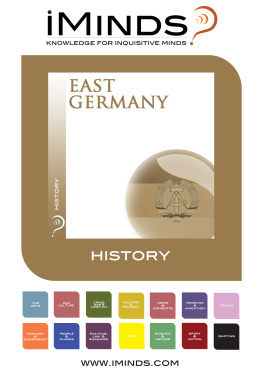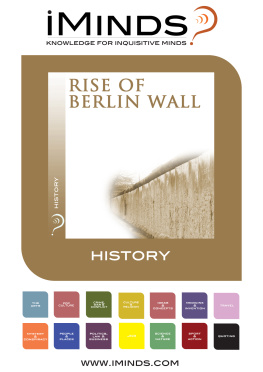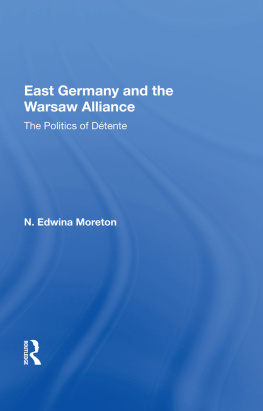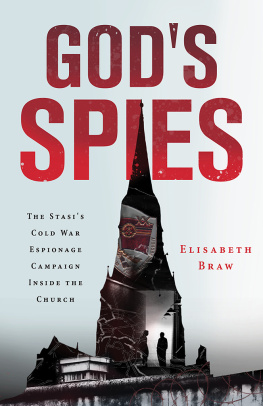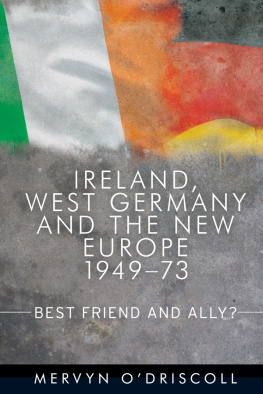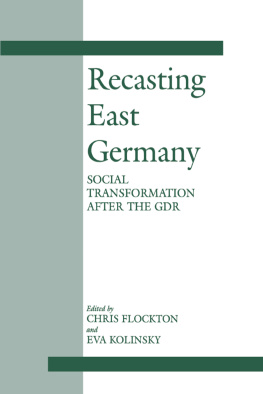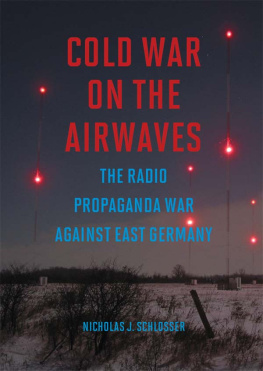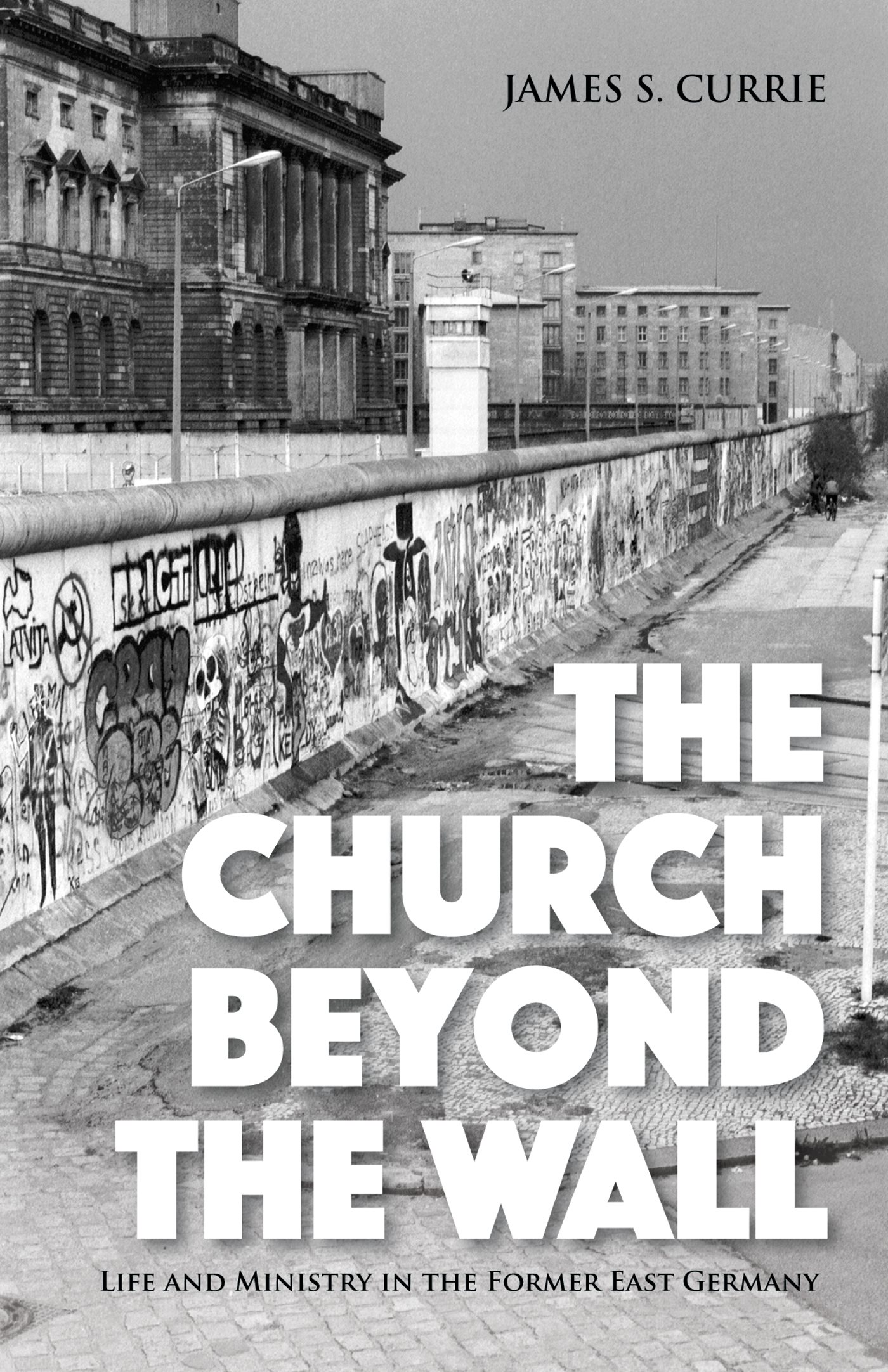The Church Beyond the Wall
Life and Ministry in the Former East Germany
James S. Currie
Preface
I n May I traveled to Germany in search of a dissertation topic. I was particularly interested in the church in the former East Germany, or the German Democratic Republic (GDR), a country under Communist rule from 1949 to 1989 . While in Halle, I had the privilege of meeting with Dr. Michael Beintker, professor of theology at the University of Halle. Professor Beintker was among those who spoke out against the regime and was acutely aware of the fact that his phone was tapped by government authorities and that he was under surveillance in other ways. Not long after our meeting in Halle, he went on to Mnster in the former West Germany where he taught theology until his retirement.
In 1991, Beintker suggested that I look into the life and thought of one Hanfried Mller, a professor of theology at the Humboldt University in Berlin. Mller and his wife, Rosemarie Mller-Streisand, were unapologetic Marxist supporters of the East German regime. Indeed, Mller eagerly served as an informant for the government for years. Mller also wrote one of the first published studies of the thought of Dietrich Bonhoeffer, Von der Kirche zur Welt in 1961 . In addition to Bonhoeffer, Mller also claims to have been strongly influenced, in a positive way, by the work of Karl Barth. My dissertation sought to demonstrate a misappropriation of the thought of both Bonhoeffer and Barth, a misappropriation due, in large part, to Mllers prior commitment to Marxist ideology.
Since the completion of the dissertation, I have become interested in the life of the larger church in East Germany, and particularly in the testimonies of both pastors and church leaders during the -year life of the GDR. The names of some of those persons are included in the pages that follow. In addition to their own words, I have been helped, among others, by such secondary works as Robert F. Goeckels The Lutheran Church and the East German State ( 1990 ) and John P. Burgess The East German Church and the End of Communism ( 1997 ).
In this study, however, I have chosen one particular person on whom to focus on, in contrast with Hanfried Mller, and that is Johannes Hamel. For most of Hamels ministry, he served as a pastor to students at the University of Halle after World War II and as a lecturer in practical theology at the University of Naumburg from 1955 to 1976 . I chose to look at Hamel because, in many ways, he reflected and tried to address the struggle many pastors must have felt as they sought to minister under difficult circumstances. I also chose Hamel because in his writings, speeches, and sermons he, like Mller, is clearly influenced by Barth, but his perspective contrasts sharply with that of Mller.
My aim is to demonstrate the importance of ones starting point in articulating the gospel. The argument here is that Mllers starting point is a commitment to Marxist ideology first and that that governs his theology, while Hamels starting point is the gospel as articulated in Scripture. Their different points of departure make all the difference in the trajectories of their thought and convictions. A second aim is to reflect on how one lives out ones convictions in a land that is hostile to those convictions.
I am indebted to Professor Beintker for his suggestion to look at the work of Hanfried Mller in the first place, to Professor John Stroup of Rice University for his supervision of the original dissertation, and to my wife, Jo Ann, without whose encouragement and support this project would never have seen the light of day.
. The dissertation is titled Christianity and Marxism: A Historical Perspective on the Role of Ideology in the Thought of Hanfried Mller. It was completed in 1997 at Rice University under the supervision of Professor John Stroup.
Introduction
I n November 1989, the Berlin Wall came down. In addition to a new political and economic openness, albeit fraught with a new set of problems and frustrations, this event opened the door wider for outsiders to examine the church in East Germany and, more specifically, the life and theology of the church that developed over the years of Communist-imposed isolation from the rest of the world.
While life in the former German Democratic Republic (GDR) was not an unknown quantity during this time, including to a certain extent the ecclesiastical and theological life, the opening of the Wall and the subsequent reunification of East Germany with the Federal Republic released and revealed, in greater completeness and complexity, voices and perspective which had heretofore been relegated to life behind the Iron Curtain.
The non-violent revolution, or Wende as it is called, has revealed a theological and ecclesiastical world that struggled with establishing its integrity, independence, and acceptance in a totalitarian Communist state. There were churchmen and theologians who opposed the regime. And there were some who embraced and supported the kind of ideology and socialism represented by the Communist state. Pastors had to decide how they would carry out their responsibilities without either succumbing to the dictates of governmental authorities or engaging in activities that might jeopardize their effectiveness as pastors.
After a historical overview of the development of the relationship between the church and the GDR, this book will first focus on Hanfried Mller, a professor of theology at the Humboldt University in East Berlin throughout the years of the GDR. As will be seen, Mller was an ardent Marxist and a strong supporter of the government. Indeed, so strong was his support that he voluntarily served as an informant for the Stasi , the East German secret police. He is of interest because of this apparent paradox of, on the one hand, being a Christian theologian, and on the other, actively engaging in activities on behalf of the government that seemed to oppose and suppress the church.
The book will then turn to those pastors and churchmen who either opposed the East German government or tried to find ways to build a bridge that allowed the church to carry out its responsibilities without interference from the state. The names of some of these persons may be familiar, while others may not, but all sought to be engaged with the issue of faithfulness to the gospel of Jesus Christ in their own way. Some were more conservative, favoring policies identified with the western powers, while others, though more progressive, did not support the more repressive policies of the eastern powers. Most specifically, attention will be given to Johannes Hamel ( 1911 2002 ) and his ministry as seen primarily through two publications: How to Serve God in a Marxist Land (a conversation between Hamel and Karl Barth) and A Christian in East Germany , a collection of writings and presentations by Hamel.
One of the more fascinating aspects of the events of November is the role that the church played, not only in providing space for prayer services in the months leading up to November, but also in encouraging any and all protests be peaceful and nonviolent. Leipzigs Nikolaikirche was one of the centers of regular Monday evening prayer services. Christian Fhrer served as that churchs pastor. Upon Fhrers death on June , 2014 , German President Joachim Gauck wrote, Christian Fhrer was a bearer of hope to many people, both in his profession as a pastor and as one of the defining figures of the peace prayers in the Church of St. Nicholas as well as the Monday demonstrations in Leipzig that led to the peaceful revolution in East Germany. Like Christian Fhrer, there were other pastors and church leaders who protested, peacefully, in a way that contributed to the downfall of the East German government.



